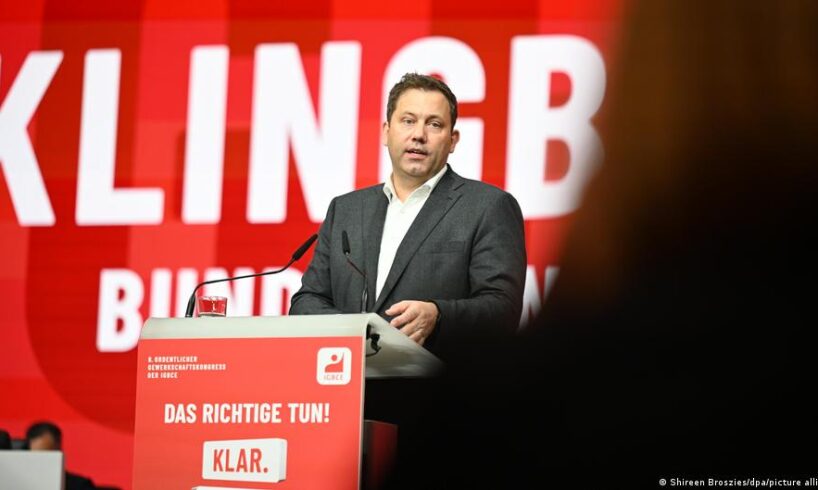
Lars Klingbeil’s trip will be the first visit to China by a cabinet minister of the current German government and the trip to Berlin’s most important trading partner comes at a sensitive time.
Chinese export controls, especially on rare earths, have highlighted the German economy’s heavy dependence on China. The German automotive industry, for example, has felt the effects as it faces a shortage of important parts.
The trip comes six months into the current government’s term and the finance minister and vice chancellor is scheduled to arrive to Beijing on Monday for high-level talks. Klingbeil will meet with his Chinese counterpart as part of the “financial dialogue” bilateral talks held regularly every two years.
How Merz aims to regain Germany’s standing on foreign issues
To view this video please enable JavaScript, and consider upgrading to a web browser that supports HTML5 video
Foreign minister triggers diplomatic spat
Foreign Minister Johann Wadephul had planned to travel to China at the end of October to address trade issues and other difficult topics such as China’s support for Russia in the war against Ukraine. His trip was supposed to prepare the ground for a visit by Chancellor Friedrich Merz .
But the foreign minister canceled the trip at short notice when it became clear that he would not meet with any high-ranking interlocutors other than his Chinese counterpart Wang Yi.
Previously, Wadephul had criticised China’s Indo-Pacific policy as increasingly aggressive. A Chinese Foreign Ministry spokesperson had also criticized Germany’s position on Taiwan, which Beijing sees as a renegade province, noting Wadephul’s refusal to explicitly reject the island’s independence activities. However, it remains unclear whether China’s decision to confirm only one meeting was directly linked to Germany’s stance on Taiwan.
The Chinese were offended by the cancellation, but later stressed that they are still interested in an exchange with the German government.
Is the European steel industry at breaking point?
To view this video please enable JavaScript, and consider upgrading to a web browser that supports HTML5 video
Klingbeil’s conciliatory tones
In an interview with the German Press Agency, Klingbeil now struck a conciliatory tone. “We should not talk about China, but talk with China,” Klingbeil said. “It is an important international player: there are many problems in this world that we can only solve together with China,” he continued.
Like most countries in the world, Germany does not recognize Taiwan as an independent state, but still maintains contacts with the economically powerful island, whose chip industry is relied upon by numerous industries worldwide, including Germany’s.
“The Chinese side must also always know that we are watching very closely what is happening in Taiwan,” Klingbeil said. “If military action is taken, this would lead to a different view of China,” he argued.
Berlin still working on a China strategy
The new German government has not yet developed its own China strategy. The previous center-left government under Chancellor Olaf Scholz had set itself the goal of de-risking, i.e., reducing risks and dependencies on China. However, little progress was made in this direction.
Recently, awareness of the vulnerability of the German economy has increased as a result of painful experiences such as the recent “Nexperia supply shock.” In October, the Netherlands moved to take over Chinese-owned chipmaker Nexperia, prompting Beijing to ban some exports and sparking fears of chip shortages in Europe.
German firm’s motor innovation eases rare-earth pressure
To view this video please enable JavaScript, and consider upgrading to a web browser that supports HTML5 video
On Thursday, the German parliament voted to set up a commission of experts to look into German-Chinese economic relations. Politicians, along with experts from academia and business representatives, are to examine the “security-relevant economic relations between Germany and China” and present recommendations on what to do. In addition, Chinese investments into critical infrastructure in Germany are also to be reviewed.
When will Merz travel to China?
The outcome of Klingbeil’s visit will ultimately determine whether the German chancellor will travel to China in the near future. Merz’s early inaugural visits to European allies and the US earned him a reputation as a chancollor who makes an apprearance on virtually every international stage.
But his first visit to China and also to India is still pending, even six months after taking office.
This article was originally written in German.
While you’re here: Every Tuesday, DW editors round up what is happening in German politics and society. You can sign up here for the weekly email newsletter, Berlin Briefing.





